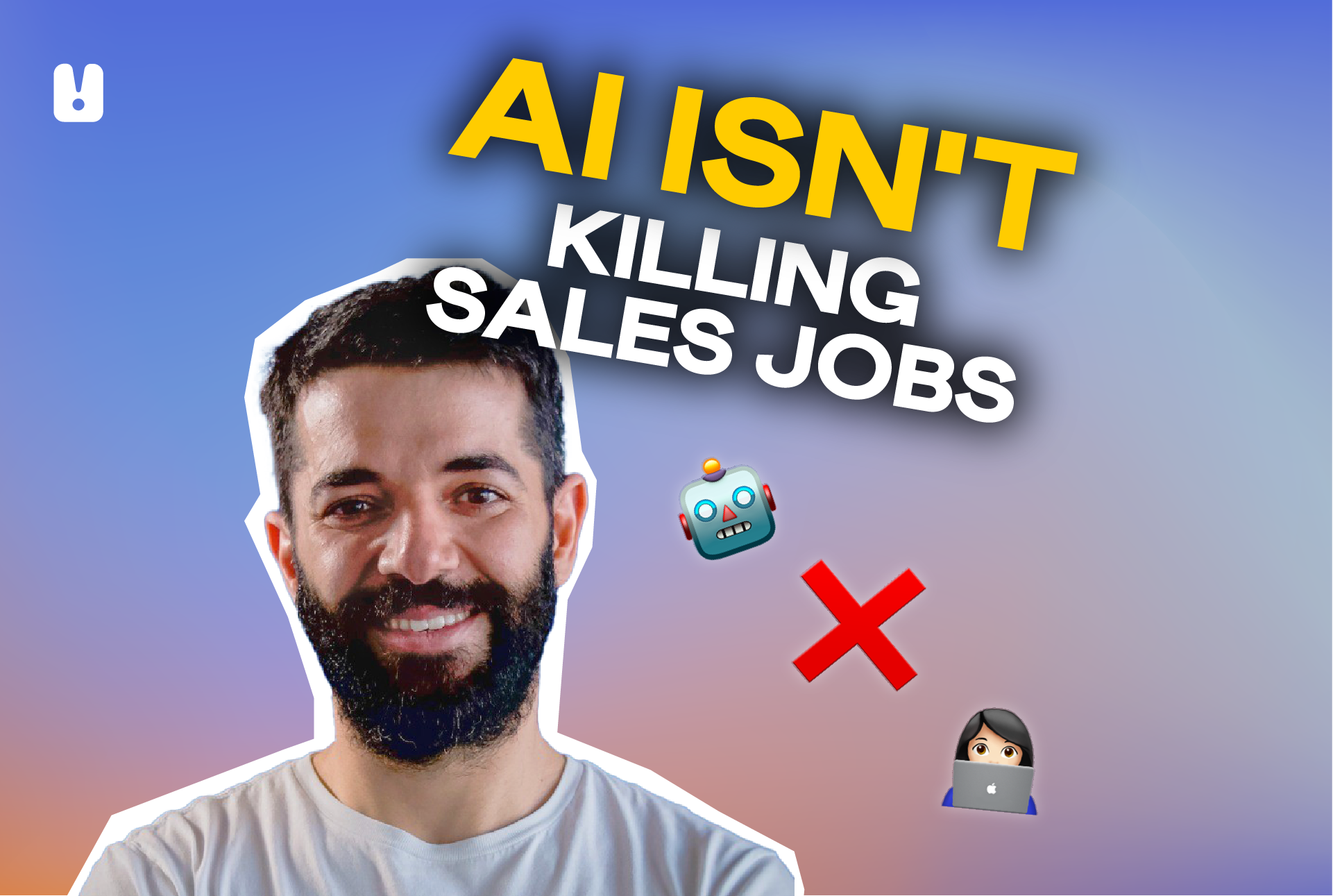

Why Your SDRs Don't Need to Be Subject Matter Experts
(And What They Need Instead)
Ali Friar - Client Manager
Keagan Stevenson - SDR Lead
Written by Keagan and Ali. With years of experience and a track record of helping clients generate thousands of qualified leads, we’ve seen firsthand what makes SDRs succeed—and what holds them back. Here’s our perspective on why your SDRs don’t need to be subject matter experts and what they actually need to excel.
[blog_at_glance]
Let us tell you about Sarah.
Sarah was our "star" SDR hire last year. Physics degree, 3 years of engineering experience, and technical knowledge that would make some of our solution architects blush. On paper, she was perfect for selling clients’ complex B2B software.
Spoiler alert: She lasted 4 months.
Why? Because she kept getting stuck in hour-long technical discussions about API integrations and systems architecture instead of, you know, actually booking meetings. (Sound familiar?)
The Weird Truth About Technical Expertise in SDR Roles
Here's the thing nobody tells you: Being too knowledgeable can actually make you a worse SDR.
We've spent 10 years managing SDR teams, and I've noticed a bizarre pattern: The more technical expertise an SDR has, the harder it becomes for them to do their actual job – booking qualified meetings.Think about it like this: You wouldn't hire Gordon Ramsay to be your drive-thru operator. Sure, he could do it, but he'd probably try to explain the molecular gastronomy behind the McFlurry instead of just taking the order.

The "Just Enough" Knowledge Sweet Spot
So what's the right amount of knowledge? We use what I call the "cocktail party rule":
SDRs should know enough to have an intelligent conversation at a cocktail party about your product, but not enough to fix someone's specific technical problems.
Conversational Skills and Why They Matter
Want to know what correlates most strongly with SDR success? According to a recent study by Gong.io, and in our experience running SDR programmes that have generated 1077% ROI, it's not product knowledge – it's conversation skills.
The top-performing SDRs excel at:
- Reading the room (or Zoom, let's be real)
- Asking questions that make prospects go "huh, I never thought about it that way"
- Knowing when to shut up (seriously, this is like 50% of the job)
- Managing conversations like a boss
The Technical Question Trap (And How to Escape It)
Here's a scenario: A prospect asks, "Can your platform integrate with our custom-built PostgreSQL database using OAuth 2.0?"
Bad SDR response: "Well actually, our REST API supports multiple authentication methods including OAuth 2.0, and we have a custom middleware layer that..."
Good SDR response: "That's exactly the kind of technical detail our solutions architect would love to dive into. They've helped dozens of companies with similar integration needs. When would be a good time for that conversation?"
See what happened there? We turned a technical rabbit hole into a meeting opportunity. (Not saying it's magic, but... 🪄)
What Your SDRs Actually Need to Know
Instead of deep technical expertise, focus on teaching your SDRs:
- The top 3-5 problems your solution solves (not HOW it solves them)
- Basic industry terminology (so they don't sound like they're reading from a script written by ChatGPT)
- Which questions to ask to identify pain points
- When to shut up and book the meeting (seriously, I cannot stress this enough)
In a perfect world, every SDR would be a genius-level expert who could also charm the socks off a prospect in 30 seconds flat.
But here's the truth bomb: Your SDRs don't need to be subject matter experts. They need to be meeting-booking experts.
As Mark Roberge (former CRO of HubSpot) once said, "The best salespeople are the ones who know how to make complex things simple, not simple things complex."
What To Do Next
If you're building or managing an SDR team:
- Stop trying to turn them into mini-product managers
- Focus on conversation skills and qualification abilities
- Teach them when to pass the technical baton
- Give them clear boundaries on technical discussions
(And if you're thinking "this all sounds great but I don't have time to build this kind of program" – well, that's literally why companies like Punch! exist. Just saying.)
Remember: Your SDRs are your conversation starters, not your solution architects. Keep it simple, keep it focused, and watch those meeting numbers climb.
Because at the end of the day, a great SDR is like a great first date – they should leave the prospect wanting to know more, not feeling like they've heard your entire life story.
P.S. For those wondering about Sarah? She's now a top solution architect at a great company, just not ours. Sometimes the wrong seat on the bus is just the right person in the wrong role.



(And What They Need Instead)
Ali Friar - Client Manager
Keagan Stevenson - SDR Lead
Written by Keagan and Ali. With years of experience and a track record of helping clients generate thousands of qualified leads, we’ve seen firsthand what makes SDRs succeed—and what holds them back. Here’s our perspective on why your SDRs don’t need to be subject matter experts and what they actually need to excel.
[blog_at_glance]
Let us tell you about Sarah.
Sarah was our "star" SDR hire last year. Physics degree, 3 years of engineering experience, and technical knowledge that would make some of our solution architects blush. On paper, she was perfect for selling clients’ complex B2B software.
Spoiler alert: She lasted 4 months.
Why? Because she kept getting stuck in hour-long technical discussions about API integrations and systems architecture instead of, you know, actually booking meetings. (Sound familiar?)
The Weird Truth About Technical Expertise in SDR Roles
Here's the thing nobody tells you: Being too knowledgeable can actually make you a worse SDR.
We've spent 10 years managing SDR teams, and I've noticed a bizarre pattern: The more technical expertise an SDR has, the harder it becomes for them to do their actual job – booking qualified meetings.Think about it like this: You wouldn't hire Gordon Ramsay to be your drive-thru operator. Sure, he could do it, but he'd probably try to explain the molecular gastronomy behind the McFlurry instead of just taking the order.

The "Just Enough" Knowledge Sweet Spot
So what's the right amount of knowledge? We use what I call the "cocktail party rule":
SDRs should know enough to have an intelligent conversation at a cocktail party about your product, but not enough to fix someone's specific technical problems.
Conversational Skills and Why They Matter
Want to know what correlates most strongly with SDR success? According to a recent study by Gong.io, and in our experience running SDR programmes that have generated 1077% ROI, it's not product knowledge – it's conversation skills.
The top-performing SDRs excel at:
- Reading the room (or Zoom, let's be real)
- Asking questions that make prospects go "huh, I never thought about it that way"
- Knowing when to shut up (seriously, this is like 50% of the job)
- Managing conversations like a boss
The Technical Question Trap (And How to Escape It)
Here's a scenario: A prospect asks, "Can your platform integrate with our custom-built PostgreSQL database using OAuth 2.0?"
Bad SDR response: "Well actually, our REST API supports multiple authentication methods including OAuth 2.0, and we have a custom middleware layer that..."
Good SDR response: "That's exactly the kind of technical detail our solutions architect would love to dive into. They've helped dozens of companies with similar integration needs. When would be a good time for that conversation?"
See what happened there? We turned a technical rabbit hole into a meeting opportunity. (Not saying it's magic, but... 🪄)
What Your SDRs Actually Need to Know
Instead of deep technical expertise, focus on teaching your SDRs:
- The top 3-5 problems your solution solves (not HOW it solves them)
- Basic industry terminology (so they don't sound like they're reading from a script written by ChatGPT)
- Which questions to ask to identify pain points
- When to shut up and book the meeting (seriously, I cannot stress this enough)
In a perfect world, every SDR would be a genius-level expert who could also charm the socks off a prospect in 30 seconds flat.
But here's the truth bomb: Your SDRs don't need to be subject matter experts. They need to be meeting-booking experts.
As Mark Roberge (former CRO of HubSpot) once said, "The best salespeople are the ones who know how to make complex things simple, not simple things complex."
What To Do Next
If you're building or managing an SDR team:
- Stop trying to turn them into mini-product managers
- Focus on conversation skills and qualification abilities
- Teach them when to pass the technical baton
- Give them clear boundaries on technical discussions
(And if you're thinking "this all sounds great but I don't have time to build this kind of program" – well, that's literally why companies like Punch! exist. Just saying.)
Remember: Your SDRs are your conversation starters, not your solution architects. Keep it simple, keep it focused, and watch those meeting numbers climb.
Because at the end of the day, a great SDR is like a great first date – they should leave the prospect wanting to know more, not feeling like they've heard your entire life story.
P.S. For those wondering about Sarah? She's now a top solution architect at a great company, just not ours. Sometimes the wrong seat on the bus is just the right person in the wrong role.





















